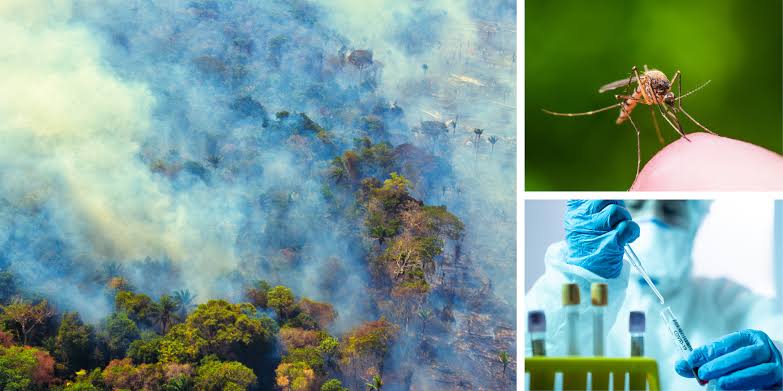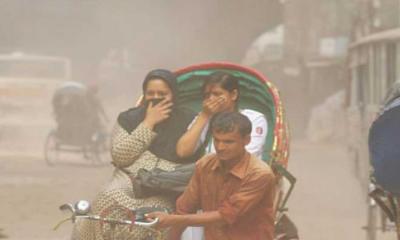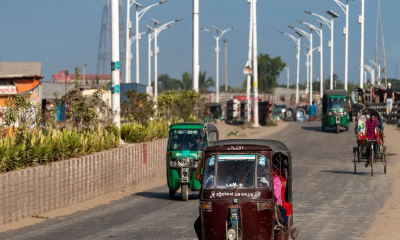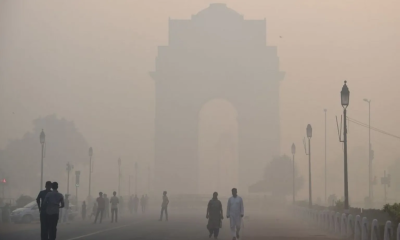A new wave of research has revealed that climate change is set to significantly increase the prevalence and severity of diseases worldwide, posing a grave risk to millions of lives.
Scientists and health experts warn that rising global temperatures, shifting weather patterns, and more frequent extreme weather events are creating ideal conditions for the spread of infectious diseases.
According to the World Health Organization (WHO), diseases such as malaria, dengue fever, and cholera are expected to become more widespread as warmer temperatures and increased rainfall provide fertile breeding grounds for the mosquitoes and bacteria that transmit these illnesses. Additionally, the incidence of respiratory and cardiovascular diseases is predicted to rise due to deteriorating air quality and more frequent heatwaves.
"Climate change is not just an environmental issue; it is a major public health challenge," said Dr Maria Neira, director of public health and environment at WHO. "We are already seeing the health impacts, and they are only going to get worse unless we take urgent action."
The Lancet Countdown on Health and Climate Change`s recent report highlights that vulnerable populations, including those in low-income countries and regions with weak healthcare infrastructures, will be disproportionately affected. These areas are less equipped to handle the dual challenges of increased disease burden and the infrastructural damage caused by climate-related disasters.
Dr Neira emphasized the interconnectedness of climate and health, noting that rising temperatures can disrupt food and water supplies, leading to malnutrition and contaminated water sources. This, in turn, exacerbates the spread of diseases. "Climate change acts as a threat multiplier for health risks," she explained.
Climate change is no longer a distant threat; it is a present reality with profound implications for global health.
Let’s take a look at outcomes from rising temperatures and heatwaves.
Increased heat-related illnesses: Higher temperatures are leading to more frequent and severe heat waves, which can cause heat exhaustion, heatstroke, and aggravate pre-existing health conditions, particularly among vulnerable populations such as the elderly and children.
Cardiovascular and respiratory issues: Heat exacerbates cardiovascular and respiratory diseases, with studies showing a direct correlation between high temperatures and increased hospital admissions and mortality rates.
Extreme weather events
Natural disasters: Hurricanes, floods, and droughts are becoming more frequent and intense due to climate change. These events not only cause immediate injuries and fatalities but also have long-term health impacts by disrupting healthcare services, sanitation, and clean water supply.
Mental health impact: The trauma and stress associated with natural disasters can lead to long-term mental health issues, including PTSD, depression, and anxiety.
Vector-Borne Diseases
Expanded habitats for vectors: Warmer temperatures and altered precipitation patterns are expanding the habitats of disease-carrying vectors such as mosquitoes and ticks. This leads to the spread of diseases like malaria, dengue fever, Lyme disease, and Zika virus to new regions.
Increased transmission rates: Higher temperatures can also increase the reproduction rates of vectors and the pathogens they carry, leading to more frequent and severe outbreaks.
Food and water security
Crop yields and food security: Climate change affects agricultural productivity through altered rainfall patterns, increased CO2 levels, and extreme weather events, leading to food shortages and malnutrition, particularly in vulnerable regions.
Contaminated water supplies: Flooding and increased temperatures can lead to water contamination, increasing the risk of waterborne diseases such as cholera and gastrointestinal infections.
Air Quality
Pollution and allergens: Climate change contributes to poor air quality through increased ground-level ozone and particulate matter. Additionally, longer growing seasons can increase the prevalence of allergens like pollen, exacerbating respiratory conditions such as asthma.
Wildfire smoke: More frequent and severe wildfires release large amounts of smoke and pollutants into the air, which can travel long distances and impact respiratory health even in areas far from the fire`s origin.
Displacement and migration
Forced displacement: Rising sea levels, extreme weather events, and degraded living conditions are forcing millions of people to migrate. Displaced populations face numerous health challenges, including lack of access to healthcare, poor living conditions, and increased exposure to infectious diseases.
Conflict and social disruption: Climate-induced displacement can lead to conflicts over resources, further exacerbating health crises and undermining social stability.
Global and local responses
Reducing Emissions: Mitigating climate change by reducing greenhouse gas emissions is crucial to preventing further health impacts. This requires global cooperation and the implementation of sustainable practices across all sectors.
Strengthening healthcare systems: Adaptation strategies include strengthening healthcare infrastructure, improving disease surveillance and response systems, and ensuring access to clean water and sanitation.
Community-based initiatives: Local communities play a vital role in adapting to climate change. Education, early warning systems, and community health programs can help build resilience against health impacts.
Calls to action
Policymakers, health professionals, and individuals must recognize the urgent need for action. Investing in sustainable practices, supporting research and innovation in healthcare, and fostering international cooperation are essential steps toward safeguarding global health in the face of a changing climate.
The WHO recommends a multi-faceted approach that includes improving access to clean water and sanitation, promoting sustainable agricultural practices, and enhancing public health education and preparedness. "Mitigating climate change is fundamental to protecting global health," stressed Dr. Neira.









-20251226051932.jpeg)






-20260303080739.webp)

















-20260225072312.webp)



